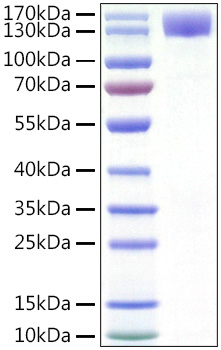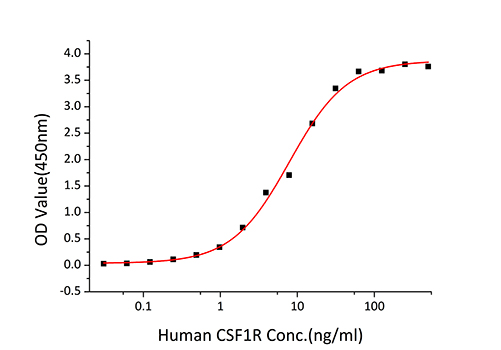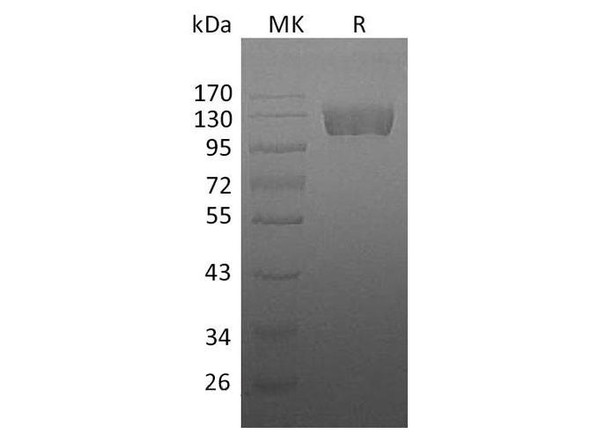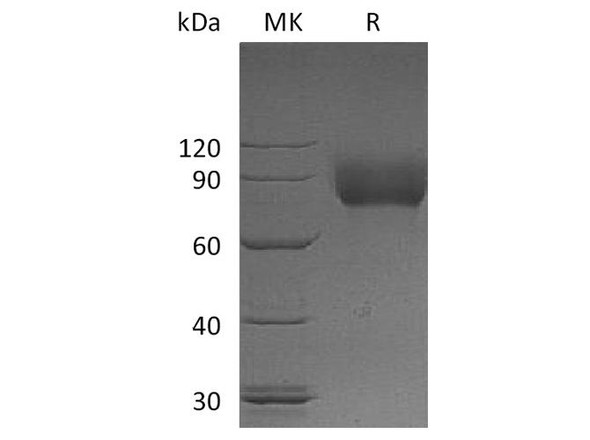Description
Recombinant Human CSF1R/M-CSF R/CD115 Protein
The Recombinant Human CSF1R/M-CSF R/CD115 Protein is a biologically active recombinant protein that plays a significant role in various cellular processes and signaling pathways in human biology. This protein is widely employed in immunological research, cell biology studies, protein-protein interaction analyses, and therapeutic development, providing researchers with a reliable tool for investigating CSF1R/M-CSF R/CD115 function and its implications in health and disease.
This product (SKU: RPCB1220) is produced using HEK293 cells and features a C-hFc&His tag for convenient detection and purification. The protein exhibits a calculated molecular weight of 81.28 kDa with an observed molecular weight of 130-160 kDa under denaturing conditions, achieving ≥ 95 % as determined by SDS-PAGE.. Functional bioactivity has been validated through rigorous quality control assays, confirming its suitability for demanding research applications.
Key Features
| High Purity by Affinity Chromatography | |
| Mammalian & Bacterial Expression Systems | |
| High lot-to-lot consistency via strict QC |
| Product Name: | Recombinant Human CSF1R/M-CSF R/CD115 Protein |
| SKU: | RPCB1220 |
| Size: | 10 μg , 20 μg , 50 μg , 100 μg |
| Reactivity: | Human |
| Synonyms: | CSF1R, C-FMS, CD115, CSF-1R, CSFR, FIM2, FMS, HDLS, M-CSF-R, BANDDOS |
| Tag: | C-hFc&His |
| Expression Host: | HEK293 cells |
| Calculated MW: | 81.28 kDa |
| Observed MW: | 130-160 kDa |
| Gene ID: | 1436 |
| Protein Description: | High quality, high purity and low endotoxin recombinant Recombinant Human CSF1R/M-CSF R/CD115 Protein (RPCB1220), tested reactivity in HEK293 cells and has been validated in SDS-PAGE.100% guaranteed. |
| Endotoxin: | < 0.1 EU/μg of the protein by LAL method. |
| Purity: | ≥ 95 % as determined by SDS-PAGE. |
| Formulation: | Lyophilized from a 0.22 μm filtered solution of PBS, pH 7.4. |
| Bio-Activity: | Measured by its binding ability in a functional ELISA. Immobilized Human CSF1 at 1μg/mL (100 μL/well) can bind Human CSF1R with a linear range of 0.01-7.8 ng/mL. |
| Reconstitution: | Centrifuge the vial before opening. Reconstitute to a concentration of 0.1-0.5 mg/mL in sterile distilled water. Avoid vortex or vigorously pipetting the protein. For long term storage, it is recommended to add a carrier protein or stablizer (e.g. 0.1% BSA, 5% HSA, 10% FBS or 5% Trehalose), and aliquot the reconstituted protein solution to minimize free-thaw cycles. |
| Storage: | Store at -20℃.Store the lyophilized protein at -20℃ to -80 ℃ up to 1 year from the date of receipt. After reconstitution, the protein solution is stable at -20℃ for 3 months, at 2-8℃ for up to 1 week. |
The recombinant human CSF1R/GST chimera consists of 667 amino acids with a molecular weight of 76 KDa. It migrates as an about 75 KDa band in SDS-PAGE under reducing conditions.M-CSFR encoded by the proto-oncogene c-fms is the receptor for colony stimulating factor 1 (CSF1R), a cytokine involved in the proliferation, differentiation, and activation of macrophages.This cell surface glycoprotein is consisted by an extracellular ligand-binding domain, a single membrane-spanning segment, and an intracellular tyrosine kinase domain. CSF1R is a receptor for a cytokine called colony stimulating factor 1, The protein encoded by the CSFR1 gene is the receptor for colony stimulating factor 1, a cytokine which controls the production, differentiation, and function of macrophages. This receptor mediates most, if not all, of the biological effects of this cytokine. Ligand binding activates CSFR1 through a process of oligomerization and transphosphorylation. Mutations in CSF1R are associated with chronic myelomonocytic leukemia and type M4 acute myeloblastic leukemia. Increased levels of CSF1R1 are found in microglia in Alzheimer"s disease and after brain injuries. The role of CSF1 and CSF1R in normal and neoplastic mammary development that may elucidate potential relationships of growth factor-induced biological changes in the breast during pregnancy and tumor progression.








